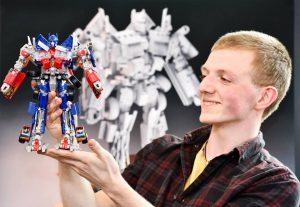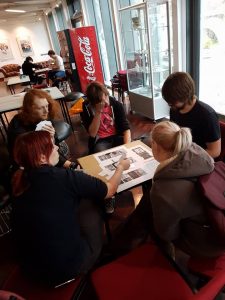Last week, the Esports Edition team was delighted to hear about the Esports Bachelor’s Degree that’s now being offered at Staffordshire University in the UK. The three-year academic program is the first of its kind, and is designed to ensure that students who complete it will be fully equipped — not to mention highly specialized — and ready to enter the esports industry workforce in whatever capacity best suits their interests and skills
Jess Lambert and J.P. Corner interviewed Stuart Kosters, student and head of the Staffordshire Video Games Society (VGS), who played a central role in pitching the idea for this new degree to administrators and faculty members. As he works towards completing his Bachelor’s Degree in Game Design at Staffordshire, he’s taking on the responsibility of Society Manager for the school’s incredibly popular Video Game Society.
Stuart is, like many gamers, always excited to talk about his passion, and he lights up when he’s describing the work he’s doing at Staffordshire.
Esports Edition: What’s your game of choice?
Stuart Kosters: Well, there are lots of games that got me into esports, but probably League of Legends.
Esports Edition: How long have you been playing League for?
Kosters: [Laughs] Some people would probably say too long, but I think I was quite late to the party. I’ve been playing for about 4 years now. It’s an interesting community, I’ll give it that. I love what Riot are doing with it, and I think they’re doing a fantastic job with the way they publicize it. I’ve gone to Worlds before, which was amazing. The passion is there [and] the community is still with them.

Esports Edition: For our American audience, can you give a quick description of what a society is?
Kosters: I would say the difference between clubs and societies is that a club is used to denote a competition. Most of the clubs we have are usually sports related–think of a “Chess Club” in America. Societies are more like community groups.
Esports Edition: In managing the Video Game Society, how much of an emphasis do you place on playing games in the same room together?
Kosters: This is going to be my first official year of taking it over from the previous leadership. I used to run a society for pool and snooker, but now I’m taking over the VGS [Video Game Society], and one of the core values of the group is community play. Gaming creates beautiful communities — people from all across the world have something in common and can talk forever. I love that. I think them all coming together in this society would be brilliant, and we’ve had huge numbers for sign-ups.
An average society gets about 50 members, but we’ve reached 450. I want to bring people together into one room, and get the feel of, say a Rezzed event. This part is playing, and not making games, but we do have another society that’s getting people to make games as well. It sets projects for the year, and helps students with their studies. Gamers are shy sometimes and quite quiet, as well. We’re known to maybe stay in our rooms for a little while. [Laughs.] It’s all about bringing people back together, creating something a little more in line with what video games used to do.
Esports Edition: And the Video Game Society is supported by Staffordshire University, right?
Kosters: Yes. It’s a really good system. We have a union, funded by charity, and Staffordshire has over a hundred communities–the union is amazing and it’s how we get all our funding.

Esports Edition: So, you’ve got the Video Game Society, which you’re taking leadership of. Then there’s also the new esports program being offered. What does that program look like?
Kosters: The program will start in September 2018, and students will be able to join a group, like League of Legends, DotA 2, Hearthstone, Counter-Strike, Overwatch, Super Smash Bros., etc. and you’ll learn about the whole esports genre of games. You’ll learn why people play them, and how they became esports. The concept people might have initially is, “oh man, I’m going to be a pro gamer!” That’s not entirely it. It’s going to give you an opportunity to play games with people in esports, participate in events, so they can have the experience of being a player. But it’s also going to give them the outline of all the things that underline esports. What coaches do, the events management that goes underneath it all, the PR, the advertising, how the actual business of esports runs. In general, the course outline is basically the business of esports. It’s broken into semesters, but it’s a three year program.
Esports Edition: Do you feel like you’re addressing a specific industry need with the program?
Kosters: The initial idea when I pitched it was all about how this is a growing industry that is playing a major role in gaming right now. It’s an opportunity for people to achieve not just their dream of designing games, but branching out into different sectors of [the gaming industry.] We have people who are very talented at filming, photography, and advertising. There are esports careers for all of these different passions, but not everyone is aware of it.

Esports Edition: Let’s talk about the actual pitch for the degree. How long has this program been in the works? When did you get involved with it? How did this all start?
Kosters: There was a previous lecturer at Staffordshire who was very, very passionate about Super Smash Brothers and they ran an amazing society around that game. But I took a class about MMOs with our head lecturer–she’s absolutely incredible–her name is Bobby Fletcher, and she absolutely does this University justice. I can’t recommend her more highly honestly, she’s very open to hearing these things and that’s so important.
Faculty and staff need to be open to hearing the views of students. If they’re on the outside, and they’re only seeing academia while [students] are going to events, [students] are seeing one side and they’re seeing another. When they communicate, you get a mix of both, and it works so well when someone’s open to listen. [Staffordshire] University is very good at listening in this way, and they supported the idea. What we did on our end is I said, as a games-supporting community fan of esports, I’m noticing a trend where universities seem to be latching onto the idea of esports. Instead of developing games, let’s give them a chance to explore the business side more. I thought, “Let’s see if out of the blue, if I can just pitch this to them, let’s see what happens.”
You May Like
At the VGS, we would give students the opportunity to play as teams, so they learned a side of esports in that way. We asked what the chances were of creating an academic side for them, where they can learn about the actual industry itself, and my lecturer on that said it was a very interesting idea. We’d had another lecturer that mentioned it previously, but the school has passed on it. It wasn’t quite the right timing, and I think timing is very important with these things. This might not have been viable two years ago, which I can understand, but with all the success and the growth, it’s more public now.
People were hearing about it, so we went forward with asking questions. Can we give the students a chance to do something that’s not just professional playing or games development? I progressed for a couple of months having conversations around that. Then we met with some brilliant people from the business module, and the school of business and the people from the games program met – this is one of the first times that those two schools have spoke about running a module together. We sat in the room and then my lecturer went, “Right. You know what you’re talking about. Pitch it.” And we pitched the idea.

Prior to that, I sat down with our lecturer, and we wrote a rough timetable for how we see each year would be, and what semesters would break down to be. Because it’s academic, it has to be more than fun and games, they need to learn something. In the first semester, we said that students would learn about the culture and have to stream the layouts that you would need on that to do this. This is the chance for them to understand what type of world esports is, what type of things you’ll need to know to be a moderator. Learn about the business of competitive gaming, so HR and PR, and how many different people are involved.
Eventually, in the third year, you’ll put on your own event. It gives students a chance to actually do it. In year two, they study the event management side. It’s all about focusing on how to deliver a quality event, so it’s kind of like a build-up process, and students need to really give it a shot for themselves, you know?
After I explained all this, [the school of business and gaming program representatives] went quiet for a little while, so I just continued to sort of do my thing. [Laughs.] But then, it came back and next thing I know, it’s in all the papers and everything.
Esports Edition: Congratulations!
Kosters: It’s brilliant proof that students, lecturers that listen, and universities can work together and when that happens, we can do great things.
Esports Edition: You’d mentioned speaking of proof. Were there any pieces of evidence it that you found you were like you were able to hold up specifically to justify the program?
Kosters: I was interested after I spoke to my lecturers about the idea, saying how big esports is getting and how fans would be interested in going to their own events. We’ve now done an event at Staffordshire, and it went well. But when I started researching to see if anyone else is actually even doing this and when I started to look in the UK, I noticed that no school is really applying this process side to what we’re doing in esports. I started looking into America, Korea, places where esports are big, and it feels like everyone’s heading in the same direction we are.
I did speak about cash prizes for players. But we talked about esports more as a general thing, that people are very interested to just get the experience and get involved in the culture to start.

Esports Edition: You mentioned that Staffordshire has hosted a larger esports event already. Is that similar to what people would be doing in their third year?
Kosters: Yes, that’s the end result. Something similar, at least. It does say that they’ll have to do a large, commercial-scale event from start to finish.
Basically, we did a test run. It was an event where we had our local rival University compete against us, and we put on games like League of Legends, Smash Bros, and CS:GO, to name a few.
It was a chance also to have societies come together to work on the same project. They can learn how to film and stream the event, and the gamers are learning how to do their thing in front of an audience. We even had people acting as “runners,” just like in the film industry, which was a whole new experience for them, and they’re all still enjoying the game atmosphere. It was very powerful.
Esports Edition: What was the attendance like? Viewership?
Kosters: We did have a fair few hundred actually turn up, which was definitely a good start. People heard that this was a success, and they’re going to look to come to more events. When I ran Global Games Jam, it was pretty much the same. Our lecturers usually run it, but it was a good opportunity when they let us give it a go ourselves. It gives us work for our portfolio. Our figures were all over the places for GGJ, but in the end, the event was amazing, and it’s had the same impact as with [the esports event], We’ve had people go, “Oh man, I want to do this now, I want to get involved.” It’s had such amazing impact, so I’m very proud of these events.
My aim here is to bridge the gap between having sections, that are separate in their methods, but with similar goals. I would like everyone from all disciplines to work in cohesion. You can form something so much bigger.

Esports Edition: Why do you think the UK esports scene has struggled?
Kosters: That’s is a tough question. It comes down to investment. From the outside perspective, looking to America or Korea, you guys seem to invest a lot more into the competitive aspect to get the very best of what you can get. When you look at the UK, I just don’t think it’s publicized and advertised to people in that way over here. I don’t feel we’ve quite understood the potential that people can have, and I don’t think they’re given the chance, why I think this program is another opportunity. It might change that.
I would love for the UK to produce female gamers as well. I watch some fantastic female streamers, and the level of their quality is just as good as many males that play this game, far above my level as well! I want to make sure that [this program] is not just male-dominated. With the new generations that are coming through, we see more female gamers. I think that’ll really make the difference, and I think streaming is a big part, and it’s to be taught in the module. I think it will put both sexes on equal ground and appeal to both as well. I know we’re getting good numbers on that too, which is to be expected, because it’s quite an appealing course from what I’m hearing…
Thanks for speaking with us, Stuart!
To learn more about Staffordshire University and their new program, you can click here.
















